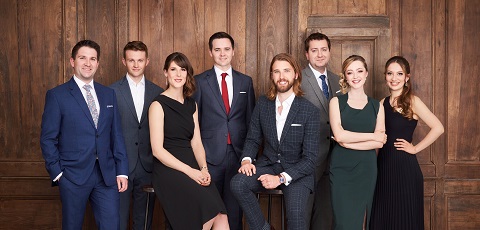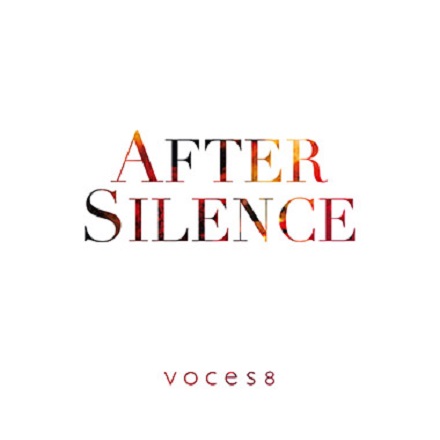In his essay ‘The Rest is Silence’, Huxley reflects on human responses to
beauty, pleasure, pain, ecstasy and death - how such things are experienced
but not ‘expressed’ through silence, and through music. Essentially, thus,
the two hours of diverse music presented by VOCES8 explores, or perhaps
represents, what it is to be human. Listening to this eclectic compendium
of choral glories, I repeatedly found myself recalling the question and
answer that Beethoven poses at the start of his last major composition, the
Op.135 string quartet: ‘Muß es sein? … Es muß sein!’
The choral works which comprise each ‘chapter’ of After Silence relate
to themes associated with the four elements: Remembrance invokes
death, loss and the return to earth; Devotion focuses on the
flames of love, sacred and secular; Redemption celebrates rebirth
and the renewed breath of life; Elemental returns to the ebb and
flow of nature.
The path of each stage of the journey is winding and far-reaching. Remembrance moves from Gibbons to Pärt, back to Byrd via Harris,
then on to Fauré, stopping at Parry on the way. A unity of performance
style - beautifully blended vocal groupings, pristine timbres and textures,
mellifluous phrasing - creates coherence, but sometimes neglects the
piquancy which springs from the dynamic union of, and tension between,
music and word, and which can momentarily inject a bittersweet drop into
the tender and poignant.
For this reason - and I’ll get what is practically my only misgiving about
this terrific compendium of choral music out of the way at the start - for
all their sonic beauty, I’m not really enamoured of the Renaissance
offerings in Remembrance. Gibbons’ ‘Drop, Drop, Slow Tears’
transfigures personal, emotional dissonance through musical and collective
consonance. This is a wonderfully affirmative communal hymn, but here the
tempo is rather slow which diminishes the sense of congregational
positivity. Rather than injecting uplifting confirmation, the phrases
threaten to dissipate: the final notes of some phrases are cut off
prematurely. This is a direct statement of Anglican faith: it needs no
mannerism and while one might expect or anticipate a breath before final
phrase, “but through my tears”, to heighten the cadential assurance, but
here we have a huge hiatus and then a rallentando which feel
unduly ponderous.
William Byrd’s ‘Ne Irascaris, Domine’ and ‘Civitas Sancti Tui’ from the Liber Sacrarum Cantionum of 1589 are similarly lethargic, and this
diffuses the impact of the accumulating imitations. The 54 entries on the
words ‘desolata est’ should overwhelm the listener, and each entry must
make its own impact and statement, especially as Byrd shuns harmonic
heightening; but here the ties, syncopations and suspension do not inject
the necessary vitality. In a short article in the generous and handsome
accompanying 52-page booklet - which includes essays, texts, translations
and visual art by Debbie Loftus - Paul Williamson notes that the choral
works showcased have been ‘freed from their original contextual
restraints’, which seems to deny that such contexts may be integral to the
music’s ‘meaning’.
VOCES8 are on firmer ground with the incantatory accumulations of Arvo
Pärt’s The Deer’s Cry - a setting of a 5th-century text
thought to be by Saint Patrick and which tells the story of Patrick leading
a group of monks through the woods, following an ambush: they are taken for
a mother deer and her calves, and so they are saved. The eight voices
expand thrillingly to fill the sonic canvas and the placing of the
fragmentary phrases amid the silences is careful and controlled. Parry’s
‘There is an old belief’ from the Songs of Farewell has a lovely
fluency: the harmonic swivels feel consoling rather than disconcerting and
there is assurance in the steadiness of timbre and tempo. The unison voices
literally thunder, “That creed I fain would keep”, then sink in reverential
awe as the sequential phrases rise with intensifying harmonic tartness.
Best of all in the Remembrance sequence is William Harris’s motet
for double unaccompanied choir, ‘Bring Us, O lord God’: the antiphonal
dynamics and phrasings swell sonorously and the final “Amen” really does
evoke the rumbling shudders of the finest cathedral organ.
 VOCES8. Photo credit: Kaupo Kikkas.
VOCES8. Photo credit: Kaupo Kikkas.
The ensemble’s artistic director, Barnaby Smith, observes that VOCES8
strives for versatility and thus alongside the canonical choral
masterpieces are works which demonstrate ‘the variety of genres and
soundworlds the ensemble employs in order to engage with our diverse
audiences’. I’m not a fan of the music of Eric Whitacre, whose ‘A Boy and a
Girl’ and ‘Sleep’ open Devotion and close the final chapter, Elemental, respectively, but millions are and many will no doubt
enjoy these offerings. Jonathan Dove’s ‘The Three Kings’ is certainly to my
liking, however. The coolness and translucency of the singers’ colours and
textures in the first section - in which Dorothy L Sayers’ text depicts the
presentation of myrrh to the infant Christ by the youngest of the magi -
occasionally flinches with a bitterness which dissolves with the offering
of frankincense, and finally thickens into liquid gold: a fountain of
dazzling drops that suddenly spray like fireworks from the spinning
Catherine wheel of overlapping laudations, “Many a gaud and glittering
toy”, as the refrain blossoms ecstatically, “O balow, balow la lay,/ Gifts
for a baby King, O”. A contrasting calm regularity is established in Philip
Stopford’s Lully, Lulla, Lullay, a setting of the Coventry Carol,
but there is no less rapture in the soaring descant flights of the final
verse.
Characteristically precise ensemble singing, and attentiveness to dynamic
and textural contrasts, articulate the diverse emotions of one Glauco, the
grieving protagonist of Scipione Agnelli’s poem, to which Monteverdi gave
musical utterance in Lagrime d’amante al sepolcro dell’amata from
the Sixth Book of Madrigals. The Italian is clearly enunciated, but there’s
a certain poetic spontaneity lacking, such as would convey the fluctuating
extremes endured by this bereaved lover before the tomb of his beloved -
and by Monteverdi himself whose own grief following the death of his pupil,
the 18-year-old Caterina Martinelli, almost drove the composer to death.
Noting ‘the great suffering I underwent’, Monteverdi later explained: “I
almost killed myself when writing Arianna.” Here, as so often,
Bach assuages the pain, in the form of ‘Jesus bleibet meine Freude’ (Jesu,
Joy of Man’s Desiring) in which VOCES8 are joined by oboist Nick Deutsch
and organist Alexander Hamilton from the Academy of Ancient Music. It’s
warm, gently expansive and consoling.
We hear again from both Bach and the Academy of Ancient Music in the
composer’s early cantata, ‘Nach dir, Herr, verlanget mich’, which closes
the Redemption chapter on disc two. The six movements interleave
excerpts from Psalm 25 and anonymous verse, as Bach depicts the believer’s
struggle to balance quotidian tribulations with faith in God’s everlasting
love. Voices and instruments are effectively balanced throughout, and the
frequent and sudden tempo changes in the choruses are confidently
negotiated. The faster sections have an uplifting vitality while the
homophonic pleas are urgent and sincere.
There are some unfamiliar names and voices in this chapter, too, which
begins with the collective conviction and peace of ‘Spaséñiye, sodélal’
(Salvation is Created (1912)), a setting of a Russian chant melody by Pavel
Tschesnokoff (1877-1944) based on Psalm 74. We travel both ‘The Long Road’,
in the form of Ēriks Ešenvalds’s (b.1977) setting verses by Latvian poet
Paulīna Bārda, and ‘The Road Home’, carried along the latter by Stephen
Paulus’ arrangement of an American tune, ‘Prospect’ (published in Southern Harmony in 1835) to which Paulus has set new words by
Michael Dennis Browne. The latter wends its way warmly, while the shining
sincerity and elation of the former is broken only temporarily by the
mystery of the voice’s soft susurrations and an ocarina’s haunting song
(Andrea Haines). The familiar is also made anew: Mahler’s ‘Ich bin der Welt
abhanden gekommen’ (from the Rückert-Lieder) is presented in an
arrangement for eight voices, obbligato cor anglais and solo soprano, the
latter sung by Mary Bevan. Deutsch’s firm, warm cor anglais complements the
shining intensity of Bevan’s vocal line and, above and around the dense
mass of voices, their conversation achieves a peaceful apotheosis.
Elemental
includes two world premiere recordings of works commissioned by VOCES8:
Jonathan Dove’s ‘Vertue’, a thrilling kaleidoscopic celebration of vocal
colour, and Mårten Jansson’s ‘An Elemental Elegy’ which floats with an easy
melodism and elegiac sweetness. Britten’s Hymn to St Cecilia is
the longest work included in the four chapters of After Silence,
and it inspires some of the finest singing from VOCES8. The voices caress
the lilting phrases of ‘In a garden shady’ but the assertive declarations
are a glistening blaze, fired by rhythmic strength and vitality. ‘I cannot
grow’ is sprightly, pattering on tiptoe then blossoming in mischievous
bursts of light, while the final movement’s depiction of the ‘dear white
children casual as birds’ manages to convey both heavenly heights and the
reality of human experience. The unison plea to Blessed Cecilia - “appear
in visions,/ To all musicians, appear and inspire” - which closes each of
the three parts is first innocently hopeful, then more urgent and pressing,
and finally a euphonious resolution of angelic innocence and earthly
experience.
Huxley’s essay, ‘The Rest is Silence’ (from Music at Night and Other Essays (1931)) is printed within the
booklet. At a time when live performances have been silenced, concert halls
gather dust and we struggle to understand the unimaginable and articulate
the inexpressible, Huxley’s concluding words seem apposite: ‘When the
inexpressible had to be expressed, Shakespeare laid down his pen and called
for music. And, if the music should also fail? Well, there was always
silence to fall back on. For always, always and everywhere, the rest is
silence.’
Claire Seymour
VOCES8 performed works from
After Silence in the first concert of the
Live from London festival which runs each Saturday evening for ten weeks. Ticket holders
will be able to watch live and/or on demand from the date of broadcast
until 3rd October and in addition will be granted viewing
rights to the full, 4K post-produced, concert films from the 4 th-31st October. Each broadcast concert lasts 60
minutes.

